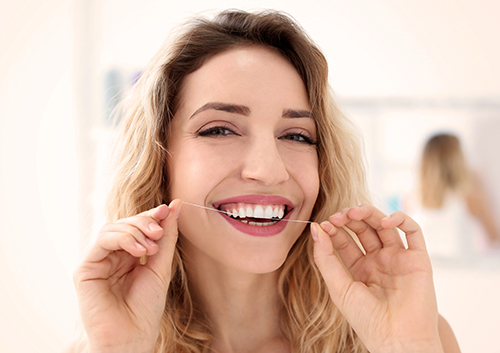The Stages of Gum Disease
July 9th, 2025

Taking care of your gums is one of the best ways to protect your smile. But sometimes, we treat our gums like an afterthought when it comes to dental care. It might surprise you to learn just how common gum disease is—and how damaging it can be for your oral health.
Surprising Fact #1:
About half of all adults have suffered or are suffering from some form of gum disease. And about half of all children do, too. As we age, the percentages jump—in fact, some studies estimate that eventually 70% of older adults will be affected by gum disease.
Surprising Fact #2:
The major cause of tooth loss in adults isn’t tooth decay or accidents or aging—it’s gum disease.
Surprising Fact #3:
Gum disease is progressive. The gingivitis that begins with a bit of redness or some minor bleeding when you brush might seem like a temporary annoyance. But when ignored, this early form of gum disease can lead to periodontitis, a serious gum condition which causes receding gums, loose teeth, bone and tissue damage, infections, and tooth loss.
Gingivitis
Gum disease begins quietly and invisibly, and it usually starts with plaque. Plaque along the gum line irritates our gum tissue. The body’s immune system responds and triggers inflammation. Gum tissue becomes swollen and red. The gums might feel tender, or bleed easily when you brush or floss.
If you’ve experienced any of these symptoms, it’s time to call our East Lyme, CT office. Dr. James Robson might recommend better brushing and flossing habits, a professional cleaning, and/or an anti-plaque treatment. At this stage, with proper care, gingivitis is reversible.
But left untreated, gingivitis can progress over time until it becomes periodontitis. Periodontitis affects not only gum tissue, but the bone and connective tissue which surround our teeth, supporting them and holding them firmly in place.
Mild Periodontitis
As plaque and tartar continue to irritate gum tissue above and below the gum line, inflammation increases, and the gums begin to pull away from the teeth. This is a problem, because the gums normally surround the tooth roots snugly, protecting them from plaque, bacteria, and other toxins.
When gum tissue pulls away, pockets are created between gums and teeth. These pockets become home to more bacteria, causing more irritation, inflammation, and infection. During this phase, the connective and bone tissue around the tooth’s roots might start to break down.
Moderate Periodontitis
As the disease progresses, pockets become deeper. The structures that hold the teeth in place continue to break down, and the teeth start to loosen. As the gums recede, tooth roots become more vulnerable to decay.
Advanced Periodontitis
When periodontitis has reached the advanced stage, there is significant loss of tissue and bone around the teeth. Teeth become looser and foul breath, pus, and pain when biting or chewing are common. Without prompt treatment, there’s a high risk of tooth loss.
Unlike gingivitis, periodontitis isn’t reversible, and requires professional care. Advanced treatments can do a lot to restore gum health:
- Topical, time-release, or oral medications treat infection.
- Scaling and root planing, which are non-surgical deep cleaning procedures, remove plaque and tartar above and below the gum line, and smooth tooth roots to remove bacteria and help the gum tissue reattach to the teeth.
- Flap surgery treats more advanced gum infection, reducing pocket depth and re-securing the gums snugly around the teeth.
- Bone grafts, gum grafts, and other regenerative procedures are available that help restore and repair tissue damaged by gum disease.
That’s good news, and there’s even better news: Because gum disease is typically triggered by plaque, it’s very preventable.
- Brush carefully at least twice each day for at least two minutes. Don’t forget to brush along the gum line!
- Use floss at least once each day or as directed by Dr. James Robson. If you have trouble flossing, ask us for the flossing tools and techniques that will work best for you.
- See your dentist regularly to catch and treat early gum disease while it is still reversible.
While gum health is essential for dental health, healthy gums might mean more than just healthy teeth. Scientists are studying the potential links between gum disease and its effects on conditions such as heart disease, diabetes, and arthritis. Gum health should never be an afterthought. Taking care of your gums is one of the best things you can do to ensure a lifetime of healthy smiles.



